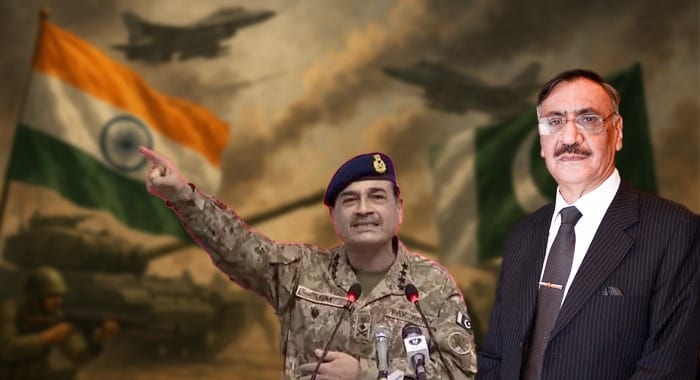Brig (R) Mehmood Shah
The recent Corps Commanders Conference, chaired by Field Marshal Syed Asim Munir following his elevation to the prestigious rank, marks a watershed moment in Pakistan’s security policy. Convened at a critical juncture, the conference not only reviewed the escalating threats to national security but also endorsed a decisive plan to confront terrorism and its facilitators—both internal and external. The tragic attack on the Army Public School (APS) bus in Balochisatn, which claimed the lives of innocent children and civilians, served as a grim reminder of the urgency with which this threat must be addressed. The armed forces have vowed that the blood of martyrs will not go in vain.
Pakistan is now clearly signaling a transition from a reactive posture to a proactive and assertive national security doctrine. The country has openly identified proxy elements supported by India, particularly in Balochistan, as the epicenter of hybrid warfare being waged to destabilize the federation. The capture of Indian naval officer Kulbhushan Jadhav is irrefutable proof of New Delhi’s deep-rooted involvement in subversive activities. India’s disturbing proclamation—“We will turn Balochistan into another Kashmir”—underscores the ideological aggression at play.
While Pakistan has historically advocated peace, its restraint must not be mistaken for weakness. India’s extremist trajectory, led by a government entrenched in Hindutva ideology, has created an environment of violence both at home and abroad. Domestically, Indian Muslims face persecution under the pretext of consuming beef—a reflection of how religious bigotry has permeated governance. Internationally, this same extremist thinking is exported in the form of terror sponsorship in neighboring countries, particularly in Pakistan.
India’s actions betray hypocrisy. It exports beef globally to fuel its economy, yet criminalizes cow slaughter at home in the name of religious sentiments. Respecting others’ beliefs should never be used as a pretext to stoke hatred or meddle in the affairs of a sovereign neighbor. Prime Minister Narendra Modi continues to spew venom against Pakistan in hopes of reaping political gains, despite facing strategic setbacks. Following their defeat in the last military escalation, India failed to progress beyond the first phase of conflict—air strikes—and surrendered before ground operations could even begin. The humiliation was evident, though never acknowledged.
This shift in Pakistan’s defense posture is not merely reactive but rooted in strategic foresight. The Corps Commanders Conference underscored the central role of the people as the true source of national strength and approved a comprehensive crackdown on terrorists and their backers. Field Marshal Asim Munir, whose elevation was a result of merit and performance, is known for his strategic clarity and results-oriented approach. Under his leadership, the armed forces have shown capabilities that have stunned Western observers. Nations such as France, Australia, and the United Kingdom have expressed interest in studying Pakistan’s air defense systems and counterstrike tactics, including the successful downing of enemy aircraft and missiles.
The roadmap for Balochistan mirrors the military’s successes in Swat and Waziristan. The separatist movement, though loud, lacks numerical strength. With a sustained and targeted strategy, it can be rooted out. Having served in Balochistan during earlier insurgencies, it is evident that progress can be made through a combination of force, political reconciliation, and community engagement. Some elements are lured into militancy by financial incentives. There have been cases of individuals from poor backgrounds—such as a shoeshiner recruited for bombings—whose families pleaded for their return. Early intervention and rehabilitation programs can prevent such tragedies.
Operations like Bunyam-e-Marsoos have not only neutralized dozens of terrorists in missions like the Jaffar Express operation but also strengthened Pakistan’s principled stance against Indian proxies. However, mere exposure of India’s covert operations is insufficient. The threat must be confronted and dismantled with finality.
The international community, despite being presented with concrete evidence of Indian-sponsored terrorism, has failed in its responsibility. Global institutions such as the United Nations have become arenas for power politics, offering little more than symbolic condemnations. In this vacuum, Pakistan has found a steadfast ally in China. The strategic cooperation between the two countries is comprehensive—reflected in joint military drills, JF-17 Thunder collaborations, and high-level coordination. This is not a transactional partnership, but one grounded in mutual trust and shared long-term objectives.
It is time for the global community to confront the reality of India’s destabilizing actions in South Asia. Silence in the face of aggression enables impunity. Pakistan, for its part, has made its position clear: it will no longer absorb attacks without consequence. The era of passive defense is over. The decisive leadership of Field Marshal Asim Munir and the unified stance of Pakistan’s armed forces are signaling a new phase—one defined by strategic clarity, military preparedness, and national resolve.





